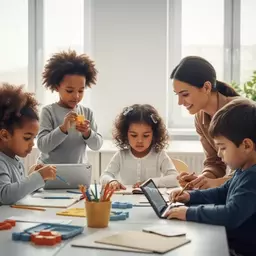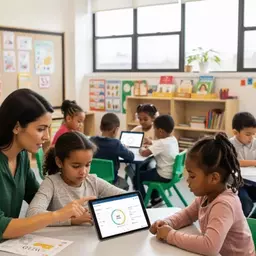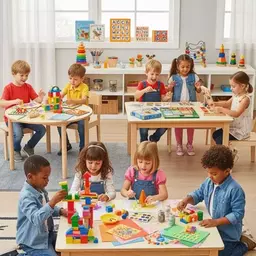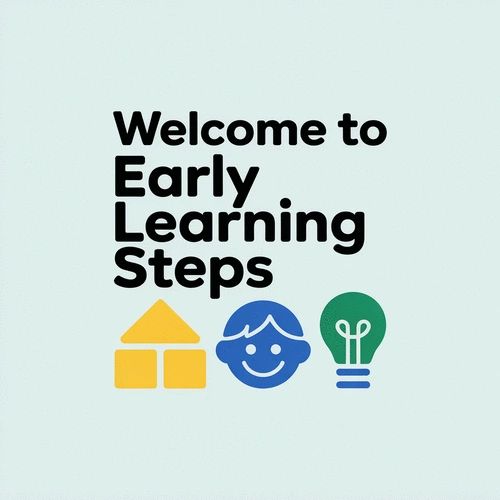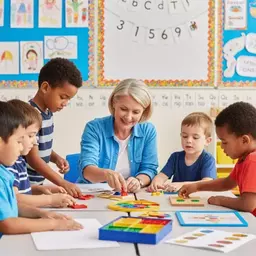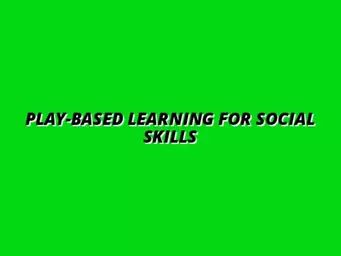Have you ever marveled at the depth of learning that occurs during a child's playtime? It’s not merely a pastime; it’s an essential component of their development that shapes their future skills and relationships. Let's uncover the pivotal role of play in early education.
What You Will Learn
- Play-based education is a philosophy that emphasizes the importance of play in child development.
- Core principles include child-centered learning, active engagement, social interaction, and emotional connection.
- Play enhances cognitive skills such as problem-solving, creativity, and memory retention.
- Emotional intelligence and social skills grow through play, helping children to express feelings and resolve conflicts.
- Creating a play-friendly environment at home and school fosters essential life skills in children.
- Parental involvement significantly enriches the impact of play-based learning, strengthening the parent-child bond.
- Positive reinforcement during play increases children's confidence and motivation to engage in learning activities.
The Pillars of Play-Based Education: Core Principles & Developmental Impact
Play-based education is built on fundamental principles that drive significant developmental outcomes. The visual below highlights the core tenets and the key benefits children gain through this approach. For a deeper dive into how play contributes to a child's mental growth, explore our article on Play-Based Learning and Cognitive Growth.
Core Principles:
- Child-Centered Learning
- Active Engagement
- Social Interaction
- Emotional Connection
Focuses on child's interests and active participation.
Developmental Impact:
- Cognitive Development
- Emotional Intelligence
- Social Skills Growth
- Physical Coordination
Fosters critical thinking, empathy, and movement.
Key Benefits:
- Problem-Solving Skills
- Creativity & Innovation
- Language & Communication
- Academic Readiness
Builds foundational skills for future success.
Encouraging Play-Based Learning:
- Daily playful activities
- Dedicated unstructured play
- Supportive play spaces
- Parent involvement
Strategies for home and school environments.
Understanding Play-Based Education and Its Importance
At Early Learning Steps, we believe that understanding play-based education is fundamental to nurturing the next generation of learners. Play-based education is not just a method; it’s a philosophy that recognizes the crucial role of play in a child’s development. By engaging in meaningful play, children explore their environment, express their creativity, and build essential skills that will serve them throughout their lives!
The core principles of play-based education revolve around experiential learning, where children learn through exploration, discovery, and interaction. This approach emphasizes the idea that children are naturally curious, and when they are allowed to play freely, they develop critical thinking and problem-solving skills. Let's delve deeper into these principles!

Defining Play-Based Education and Its Core Principles
Play-based education can be defined as a learning framework that uses play as a primary mode of teaching and learning. Its core principles include:
- Child-Centered Learning: The focus is on the child's interests and developmental stage.
- Active Engagement: Children actively participate in their learning through hands-on experiences.
- Social Interaction: Collaborative play encourages children to interact, negotiate, and work together. For strategies on fostering collaboration, see our guide on Building Emotional Skills in Preschoolers.
- Emotional Connection: Play fosters emotional development by allowing children to explore feelings and relationships.
Understanding these principles is vital for educators and parents alike! They create a supportive foundation for fostering creativity and curiosity in young learners.
Why Play Matters in Early Childhood Development
Have you ever watched a child engrossed in play? It’s a sight to behold! Play matters in early childhood development for several reasons:
- Encourages Exploration: Children learn about their environment through play, which enhances their observational and analytical skills.
- Supports Physical Development: Active play promotes physical health and coordination as children run, jump, and climb.
- Boosts Language Skills: Through imaginative play, children practice language and develop communication skills.
- Fosters Emotional Intelligence: Play allows children to express their emotions and learn empathy.
Recognizing the importance of play can transform how we support child development both at home and in educational settings. It's incredible how something as simple as play can lay the groundwork for future success!
The Role of Play in Cognitive Development and Learning Outcomes
Play is a powerful tool for cognitive development! When children engage in play, they are not just having fun; they are also building crucial mental pathways. Here’s how:
- Problem-Solving Skills: Play often involves overcoming challenges, which helps children develop critical thinking skills.
- Creativity and Innovation: Unstructured play encourages children to use their imagination, leading to innovative ideas.
- Memory Enhancement: Engaging in play can improve memory and attention span as children navigate different scenarios.
- Academic Readiness: Skills gained through play, such as counting and storytelling, directly contribute to academic success!
By nurturing play-based learning, we can significantly enhance a child's cognitive abilities, paving the way for a bright future. As we continue exploring play’s impact, we’ll uncover more about its profound effects on emotional and social development.

We Want to Hear From You!
What do you think about the role of play in your child's learning? Share your thoughts below:
Summarizing the Key Benefits of Play in Child Development
As we delve deeper into the world of early childhood development, it’s essential to recognize the significant benefits that play brings. Throughout this article, we've explored how play is not just a leisure activity, but a vital part of fostering emotional intelligence and essential social skills in children. By engaging in play, children learn to express their emotions and navigate social interactions effectively.
From enhancing their ability to regulate feelings to developing empathy for their peers, play provides a natural setting for children to grow emotionally. In essence, play is the bridge that connects children to their emotional and social worlds, allowing them to flourish in a supportive environment.
Recap of Emotional Intelligence and Social Skills Growth Through Play
Reflecting on the insights we've discussed, here’s a quick recap of how play supports emotional intelligence and social skill development:
- Emotional Regulation: Children learn to manage their feelings through role-playing and imaginative scenarios.
- Empathy Development: Collaborative play encourages children to understand and share the feelings of others.
- Conflict Resolution: Play provides opportunities for children to navigate disagreements and learn compromise.
By engaging in these activities, children not only develop critical social skills but also cultivate a deeper understanding of themselves and their emotions. These foundational experiences are crucial in nurturing confident, curious learners who can face life’s challenges with resilience.
Encouraging a Play-Based Approach at Home and School
As parents and educators, we can create an environment that encourages play-based learning both at home and in school. Here are some strategies to foster this approach:
- Incorporate playful learning activities into daily routines, such as storytelling or imaginative play.
- Set aside dedicated time for unstructured play, allowing children to explore their creativity.
- Create spaces that invite play, whether it’s a cozy reading nook or an outdoor play area.
By emphasizing play in various settings, we provide children with valuable opportunities to learn and grow. Remember, it’s about creating moments where exploration and imagination thrive!
The Role of Parent Involvement in Supporting Play-Based Education
Parent involvement is a vital component of successful play-based education. Engaging with your child's play not only enhances their learning but also strengthens the bond between parent and child. Here are some ways to get involved:
- Participate in play: Join your child in their play activities, whether it's building a fort or playing dress-up.
- Encourage creativity: Provide materials for arts and crafts, and let their imaginations run wild. For more ideas on how to foster play at home, check out our Play-Based Learning at Home Guide.
- Communicate: Ask open-ended questions during play to stimulate their thinking and emotional expression.
Your active participation can significantly enhance the impact of play-based learning, fostering an atmosphere of support and encouragement. Together, we can cultivate an enriching environment where children feel valued and understood!
FAQs About Play-Based Education
- What is play-based education?
- Play-based education is a learning framework that uses play as the primary mode of teaching and learning, focusing on child-centered activities, active engagement, social interaction, and emotional connection to foster development.
- How does play benefit cognitive development?
- Play enhances cognitive development by promoting problem-solving skills, creativity, innovation, memory enhancement, and ultimately contributing to academic readiness through engaging and imaginative scenarios.
- Why is emotional intelligence important in early childhood, and how does play help?
- Emotional intelligence is crucial for children to understand and manage their feelings and empathize with others. Play aids this by providing opportunities for emotional regulation, empathy development through collaborative activities, and conflict resolution.
- What role do parents play in play-based education?
- Parents play a vital role by actively participating in their child's play, encouraging creativity through various materials, and communicating effectively by asking open-ended questions. This involvement strengthens the parent-child bond and enhances learning outcomes.
- How can play-based learning be encouraged at home and in school?
- Play-based learning can be encouraged by incorporating playful activities into daily routines, setting aside time for unstructured play, creating inviting play spaces, and ensuring a supportive environment where exploration and imagination can thrive.
Taking Action: Supporting Play-Based Education
Now that we've explored the incredible benefits of play, it’s time to take action! Supporting play-based education is a shared responsibility between parents, educators, and the community. Here are some effective strategies to promote play in daily life:
Ways Parents and Educators Can Promote Play in Daily Life
Integrating play into everyday routines is an excellent way to support child development. Here are some practical ideas:
- Encourage outside playtime, allowing children to explore nature and engage in physical activities.
- Incorporate games and interactive stories during car rides or waiting times.
- Utilize educational toys that promote learning through play, such as puzzles or building blocks.
By embedding play into daily experiences, we provide children with valuable opportunities to learn and grow.
Resources for Further Learning About Play-Based Education
For those looking to deepen their understanding of play-based education, numerous resources are available. Here’s a curated list that might help:
- Books: Look for titles on play-based learning, emotional intelligence, and early childhood development.
- Online Courses: Many organizations offer courses that focus on play strategies and teaching methods.
- Webinars and Workshops: Participate in events that offer insights from experts in early childhood education.
These resources can enhance your knowledge and equip you with the tools to support playful learning effectively. When we invest in our understanding of play, we invest in our children's futures!
Understanding the Impact of Positive Reinforcement in Learning Through Play
Lastly, let's discuss the importance of positive reinforcement in play-based education. Encouraging children through praise and rewards during play can lead to:
- Increased Confidence: Positive feedback boosts self-esteem and motivates further engagement.
- Enhanced Learning: Recognizing achievements reinforces desired behaviors and promotes skill development.
- Stronger Relationships: Positive interactions foster trust and build a supportive learning environment.
In essence, when we celebrate our children's successes, we nurture their love for learning and exploration. Let’s empower our kids to embrace their imaginative journeys!
Recap of Key Points
Here is a quick recap of the important points discussed in the article:
- Child-Centered Learning: Focus on the child's interests and developmental stage.
- Active Engagement: Hands-on experiences encourage children to participate in their learning.
- Social Interaction: Collaborative play fosters negotiation and teamwork among children.
- Emotional Connection: Through play, children explore feelings and relationships, enhancing emotional intelligence.
- Problem-Solving Skills: Overcoming challenges during play develops critical thinking.
- Creativity and Innovation: Unstructured play sparks imagination and innovative ideas.
- Parent Involvement: Active participation in play enhances learning and strengthens bonds.


